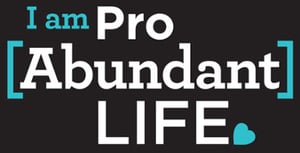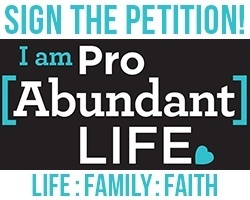Is offering a poor mother and father an abortion the most compassionate response to their situation?
A few weeks ago, I wrote an article about the US Department of Transportation’s estimate that the statistical value of a human life in the United States is $9 million. This means that our society has valued the economic and social contributions of one lifetime at greater than $9 million. With close to one million abortions a year, abortion costs the United States more than $9 trillion.
Personally, I think every human being is priceless and even $9 million is small change next to the value of a single human life. I suspected that my article would receive negative comments on social media for attempting to put a numerical value on human life. To my surprise, most commenters seemed to think that the financial estimation of human worth was too high.
Here are just a few of the many comments my post received:
Marsha said, “We are so overpopulated and all those people forced to work at minimum wage these days surely don't contribute anywhere near the money you choose for an example.”
Steven wrote, “There are too many d****d people on the Earth now we can't afford any more. It's called carrying capacity and I learned about it in the 3rd grade in 1962!”
Wendy commented, “A fetus is not a child. Many studies have shown that when couples are forced to have children they don't want, they sink into abject poverty, the children suffer horribly, and so do the parents, and children who grown [sic] up in poverty tend to not achieve very much-end up in prison, end up dead, work minimum wage part time jobs. Abortion is a good thing…. Abortions have reduced the crime rate to all-time lows (because unwanted children tend to be abused and neglected and grow up and turn into criminals).”
Each of these comments is based on common assumptions about the women and men who have abortions and about the value of the lives impacted by the procedure.
Assumption one: The economy, and by extension society, is better off when poor people abort their children.
According to Wendy, “children who grown[sic] up in poverty tend to not achieve very much-end up in prison, end up dead, work minimum wage part time jobs.” To be fair, Wendy’s argument is not new. When economists released a study on the impact of abortion on crime, they found that the crime rate decreased. This caused some to argue for expanded abortion in lower income communities. When Margaret Sanger started Planned Parenthood she found many wealthy industrialists willing to support her organization when she promised that contraception and abortion would lower the number of “undesirables” entering the economy.
After all, it requires extensive time and resources to correct the systemic cultural, racial, and educational barriers in these low-income communities. Abortion is a far easier and quicker “solution.” It should be no wonder that from its inception, Planned Parenthood places most of its abortion clinics in low-income communities.
Planned Parenthood and other abortion activists would argue that people below the poverty line should not be burdened with children. Several commentators on Care Net’s Facebook page have made similar arguments. Abortion, they say, is a form of “compassion” for the underprivileged that saves them from the costs of raising children. However, there is a devastating issue with this approach to poverty: it kills members of the community that it claims to try to help.
Countless Americans have grown up in homes below the poverty line. For the first ten years of my life, I grew up in a poor area of Miami-Dade County called “Sweetwater.” I was too poor to know I was poor. I remember living in our duplex, playing by the street, and getting free Christmas gifts from a community outreach sponsored by the city. At the time, I never stopped to realize why I was getting free toys. It was because I was one of them—the “poor” in need of assistance.
Based on the logic of abortion as a form of “compassion,” the kids I played with in the street and I would have been better off never being born. If our parents had simply aborted us, they could have avoided the costs associated with raising us.
While prevalent, this argument and the policies based on it do not sound compassionate when considered for more than a few seconds.
Yet, when one examines the work of Planned Parenthood International, one finds that they have promoted much of this same philosophy all over the world. Planned Parenthood International has partnered for decades with China’s government-run family planning agency. How does China’s government promote economic success? By using forced sterilization, abortion, and contraception to ensure that no one has more than two children. That’s their solution. Their legislators believe that fewer Chinese people, which programmatically means fewer Chinese women due to their patriarchal society, is better for China.
Assumption Two: There are too many people in the world… more babies will lead to famine and war.
Ever since mathematician Thomas Robert Malthus first postulated in 1803 that the world’s population would grow exponentially while our food supply would only grow incrementally, there has been fear that we may have too many children.
In 1968, Paul Ehrlich published his bestselling book The Population Bomb. In it he argued that our world was heading to a population-induced apocalypse. He wrote that the world’s population would double from 3.5 billion people to 7 billion by 2005, a prediction that was six years early (we hit 7 billion in 2011). This increase in population would cause massive worldwide famines, war over depleted resources, and an incredible loss of life. The world would face dire consequences for surpassing its “carrying capacity.” His solution? Forced population control. He wanted governments to place high taxes on baby items to de-incentivize procreation and called for forced sterilization of fathers of three or more children in India. When he was criticized for advocating for such oppressive policies he responded, “Coercion? Perhaps, but coercion in a good cause.”
Organizations like Planned Parenthood International and the United Nations Population Fund still operate based on these assumptions. Policies like China’s two-child law are also rooted in these ideas. Even Bill Nye's new Netflix series, Bill Saves the World featured an episode about "sponge people" and the dangers of overpopulation.
Yet, the world’s population has already doubled and there has been no “population bomb.” What prevented the bomb from detonating? Human innovation. While Ehrlich was correct that the population was increasing, what he failed to account for was the human creativity and scientific advancement that vastly improved irrigation and farming techniques around the world. We produce more food on fewer acres of land. Furthermore, countless studies have shown that issues with starvation in “third world” nations are not the fault of overpopulation, but of corruption and other barriers to effective food distribution.
Addressing those issues would require foreign governments to embrace economic systems prone to success and human flourishing, rather than to profit from corruption and other failed centralized government programs. Abortion once again is a cop out “solution” to a complex problem.
A Better Way
 Arguing for abortion as compassion requires devaluing more than the children killed by the procedure: it requires devaluing their parents and communities as well. Saying that poor communities raise criminals requires dismissing those in lower income communities as lesser members of our society. It says that an unwanted child cannot do great things. That poor parents have too little to offer their children. That crime is the fault of poor people rather than a poor system of justice, education, and culture.
Arguing for abortion as compassion requires devaluing more than the children killed by the procedure: it requires devaluing their parents and communities as well. Saying that poor communities raise criminals requires dismissing those in lower income communities as lesser members of our society. It says that an unwanted child cannot do great things. That poor parents have too little to offer their children. That crime is the fault of poor people rather than a poor system of justice, education, and culture.
As a pro abundant life person, I understand that it is impossible to calculate the social and financial impact of an unborn child’s life. As Simone Biles showed the world at the last Olympic games, an unwanted pregnancy can birth the greatest gymnast in history. Yet, the circumstances that surrounded her mother’s pregnancy were the same ones that abortion advocates say often require abortion.
Every single human life brings with it the potential birth of the next great idea to revolutionize science, industry, and the economy. We know of Steve Jobs, Marie Curie, Amelia Earhart, and Martin Luther King Jr, because each of their parents had the courage to bring them into this world and raise them, regardless of the circumstances into which they were born. Every single advancement in world history has been created by a person and history shows that the greatest wealth a community possesses is its people. Abortion advocates are right when they say that abortion is cheaper than raising a child. What they miss is the incredible value to our world that is destroyed when we decide that some lives are not worth saving.
This is why Care Net has dedicated more than forty years to empowering women and men facing difficult pregnancy decisions with the resources necessary to choose life. Women and men receive compassion, hope, and help regardless of their financial circumstances, religious beliefs, or sexual orientation. Last year alone, our pregnancy centers saved communities more than $56 million in services.
Is this work easy? No. But it is good.
I can understand the desire to help poor communities and poor countries rise above poverty and difficulty. I grew up in a poor neighborhood. But let me assure you that killing me would not have made those problems go away. Compassionate, deliberate, and passionate engagement by those brave enough to look at members of these communities as people, not just statistics, is how communities like Sweetwater can change. Abortion is too costly a solution.






